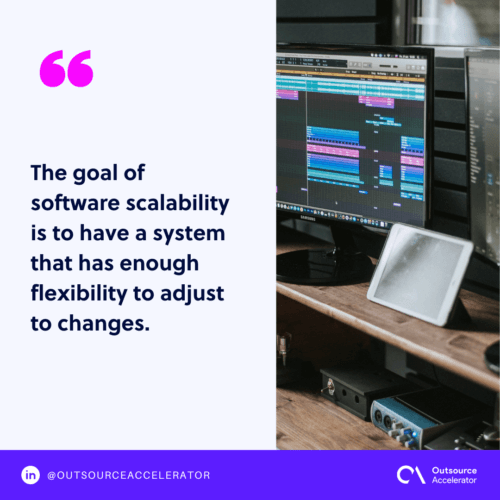What is software scalability?

Industries change quickly, and a company that fails to follow gets left behind very quickly. It’s a good idea to set up systems that are able to keep up with demand.
A good technology base[1] at the core of your business will help a lot. And thus, businesses employ software scalability.
Software scalability definition
Software scalability refers to the ability of a software application to grow and handle increasing amounts of data and user requests.
A scalable software doesn’t need to be redesigned to maintain effective performance after an increased workload.
Software scalability doesn’t just handle integrating new users, but also introducing them to the system. Ease is part of the capability.
The key question is about volume. When testing a system for its scalability, developers need to consider the volume of requests the software can handle without sacrificing:
- Stability
- Resources
- Cost
Today’s products need to be designed with growth in mind in the rapidly evolving industry. Scalable software ensures a business stays relevant and functional even while the demands of users grow.
Now there are even scalability metrics to accurately measure and upgrade software.[2]

Types of software scaling
Software scalability can take different forms depending on the affected part of the system, though they generally fall into one of three divisions. All cover a software’s performance, maintenance, and expenditure.
Vertical scaling
This type is also called “scaling up.” It involves software scalability by using more advanced or stronger hardware. This type mainly focuses on the quality of a single system, done through more disk space or a faster CPU.
Vertical scaling gives you better performance than scaling out. Only a single computer, server, or “node” acts as the home of your data, allowing focused, massive computing power. Everything being in one place also makes for faster returns and less vulnerability to attacks.
This is the type of scaling applied when developers have an indication of how much workload the server needs to address. Only adding resources to a single server also means low costs.
However, it isn’t recommended if the software needs to grow quickly with little notice. It takes time to implement new features.
Eventually, businesses may end up upgrading to the point of overspecialization, which results in the software being used less.
Horizontal scaling
Also called “scaling out,” this option is more popular with enterprises. It involves adding more physical hardware servers to your system and spreading the workload across the new infrastructure.
Adding more “nodes” is the method used by massive social networks when increasing the capacity to share processing power.
During the scaling process, your application remains online at all times as you’re simply adding to it. Nothing has to be imported or rebuilt, and customizing is easier.
Horizontal scaling is also the less expensive option in the long run. Your new servers can be the same type or compatible with your current ones, saving you from buying more expensive ones. You only pay for the servers in use, not the entire infrastructure.
There is a drawback in speed that is limited by communication between servers, but this usually isn’t noticed by users, and there are tools to solve this.
Overall this is considered the better software scalability solution.
Autoscaling
Autoscaling is the lesser-known “third type” of software scaling. This is actually just a combination of the two previous scalability models.
Autoscaling monitors changes in your applications and automatically adjusts its capacity to maintain performance at optimal levels.
Factors in software scalability
When scaling software, companies should take note of these basic things to consider.
Functionality
The goal of software scalability is to have a system that has enough flexibility to adjust to changes. A proper framework should be assigned as well as the kinds of functions that are to be integrated.
Companies should also consider whether they have the resources to do so. As much as possible, they should maintain the quality and functionality of the original version.

Database
This factor is especially relevant for sites with a lot of unstructured data.
Companies may choose a relational database, which gives access to large amounts of information. Or they may choose an object store database, which is ideal for making quick changes in a short time.
Code
Good code is essential for software scalability. High-quality code will have longer-lasting output, is easier to duplicate and test, and allows easy implementation of future modifications.
Maintenance
Companies should make sure that their software is convenient for usual testing and preservation. A scalable software that’s set up for testing will highlight bugs clearly, making the maintenance process faster.
Usage
As per the definition, software scalability concerns the volume of users. When scaling, companies should measure the number of users or connections the software may possibly need to handle. Increasing it is as simple as adding resources.
Importance of software scalability
There will always be a need to change and grow with your user base. A company that operates with software scalability in mind is one that prepares for success.
Here are a few benefits of software scalability.
Overall performance
The more data stored or the more user requests that a system has to deal with, the more strain there is on the software’s infrastructure. Eventually, this may overwhelm a rigid system, and the result is a drop in performance.
Software that isn’t scalable is also more vulnerable to security threats. Advancing cyber attacks will always take advantage of older, more primitive technology.
For small businesses and startups that plan to grow, it’s advisable they prioritize a scalable software model.
Business opportunity
Scalability in business also means seeing opportunities for innovation when they pop up. Software scalability allows you more flexibility and the ability to catch opportunities you might have otherwise missed.
Innovative businesses are more likely to be patronized. Your scalable software will let you adjust to market needs more quickly and always stay at the peak of serving your users’ needs.
Room for change
Just as the marketplace is an ever-changing storm, the companies themselves can be too. When a company shifts priorities, their software bundles may lose relevance.
Instead of adopting less agile applications, companies can make use of scalable software and simply build onto those foundations. It’s less expensive and makes operations more efficient over time.







 Independent
Independent




